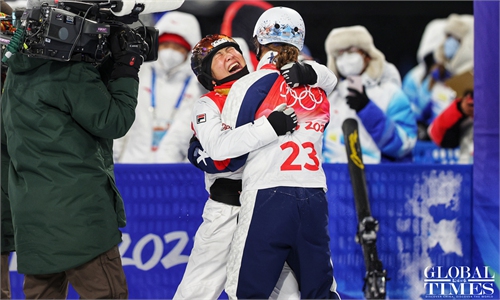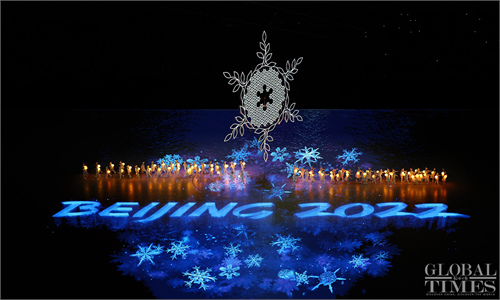China shows its rejuvenation path to world via Winter Olympics 14 years after Beijing 2008
Beijing 2022 shows China's ability to deal with crisis, achieve 2035 goal
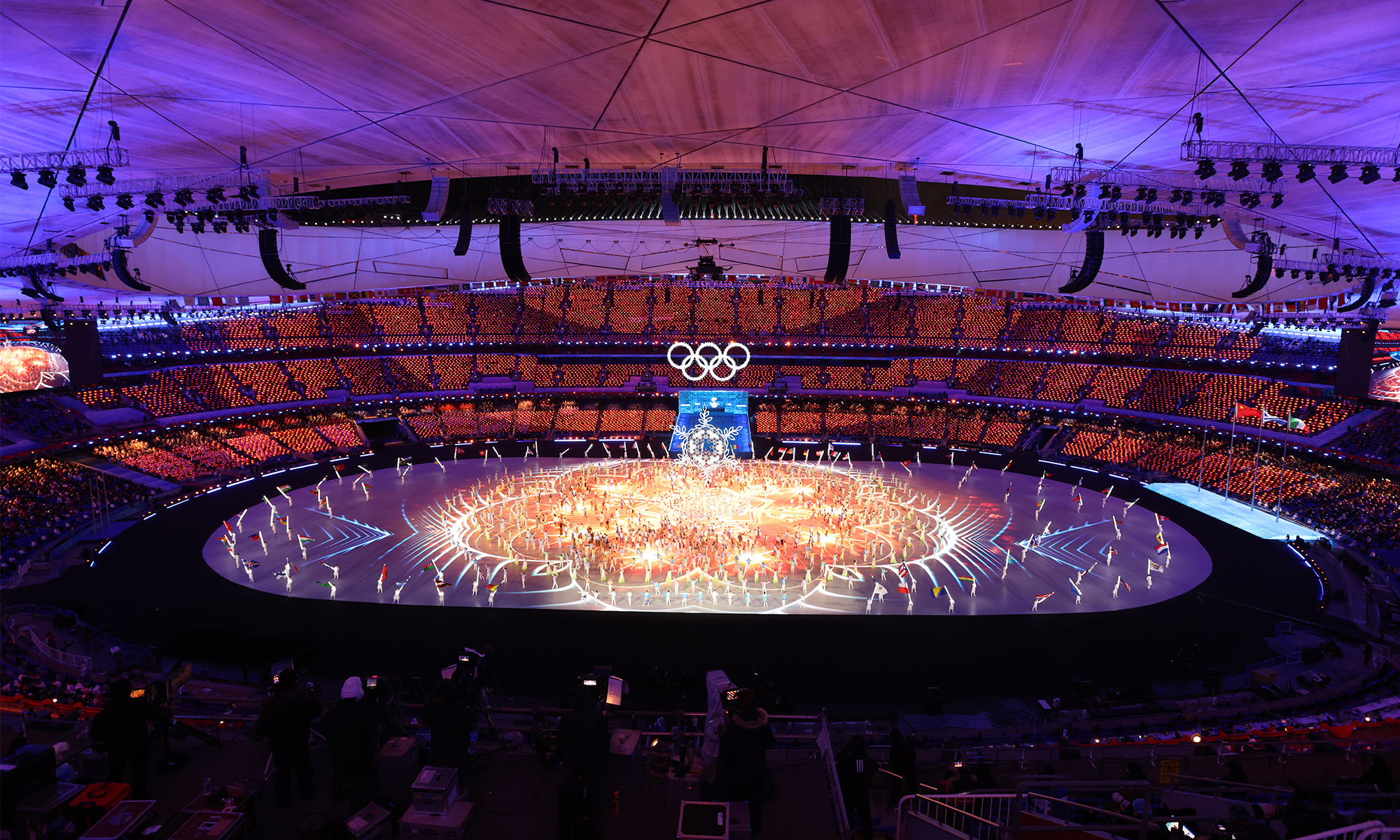
The closing ceremony of Beijing 2022 Olympic Winter Games. Photo: Li Hao/GT
By hosting the 2008 Beijing Olympic Games, China stunned the world with its modernity and prosperity. Another 14 years on, the country, which has already grown into a major global power, dazzled the world again by hosting a "truly exceptional" Olympic Winter Games. If the summer edition of the Olympics impressed the world with China's booming development, the world, especially the West, witnessed the efficiency of the Chinese mode and system in the working by way of the Winter Olympics, said experts.
Just like the 2008 Olympics, this Winter Games will also have served as a milestone in China's road to its great rejuvenation, they said.
During the closing ceremony of the Beijing 2022, You and Me, the Beijing 2008 Olympic Games theme song, was sung again by a group of children, arranged by Zhang Yimou, the director of Winter Olympics' opening and closing ceremonies, to pay tribute to the 2008 Beijing Olympics, a platform China used to stun the world with its openness and development 14 years ago.
Zhang, also the director of the opening ceremony of the 2008 Beijing Olympics, said during a Monday interview that he was doing his utmost to present the world China's 5,000-year civilization by filling the ceremony with elements of traditional Chinese culture. Yet the Beijing Winter Olympics were concluded in a much more streamlined yet equally impressed way, and won kudos from people across the world.
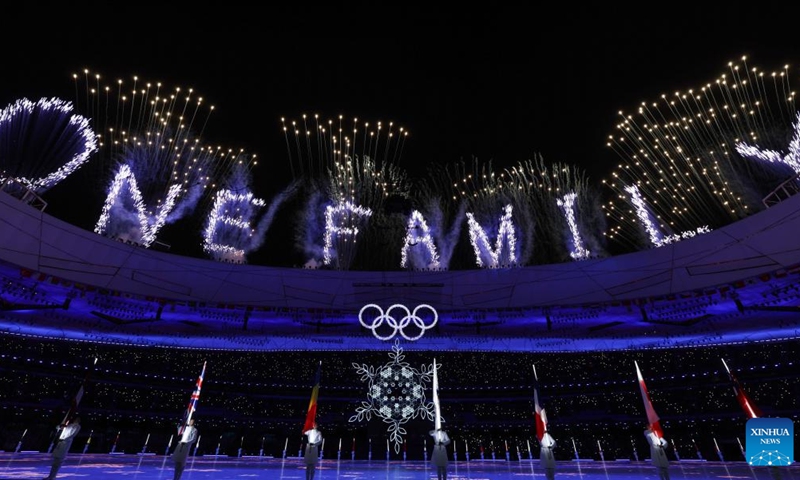
Fireworks illuminate the night sky during the closing ceremony of the Beijing 2022 Olympic Winter Games at the National Stadium in Beijing, capital of China, Feb. 20, 2022. Photo: Xinhua
"After dozens of years, we are different; there are many changes to me and to my country. We can present the closing ceremony in a streamlined way, and have the world stand together with us. We are more confident, and unhurried," said Zhang.
The two Olympics, hosted by China 14 years apart, may find themselves placed within similar circumstances, where the rest of the world was bogged down by an economic crisis in 2008, and now deep in the COVID-19 pandemic. The two Olympics also faced a small group of countries which staged the "boycott" farce. However, 14 years later, here comes a different China.
It is widely acknowledged by observers that before 2008, China, despite the then booming economy and rapid development, remained obscure to quite some from the outside world.
In 2008, by hosting the Summer Olympics, China made a dazzling appearance in front of the world, and upended many countries' stereotype of an outmoded and poor country, Zheng Ruolin, a research fellow at the China Institute of Fudan University, told the Global Times on Monday.
"The context of the 2008 Olympic Games was very different [from the Winter Olympics]. It was about the rise of China, the growing curiosity and interested in China. China's coming-out was seen from the Olympics to the world," Martin Jacques, a senior fellow at the Department of Politics and International Studies at Cambridge University, told the Global Times on Monday.
"This [Winter Games] was China putting on a great show in a very difficult and different situation. And I think the fact that China managed to do so well [in controlling COVID-19 and resisting a so-called diplomatic boycott] is very positive. The Winter Olympics are a victory for China," noted Jacques.
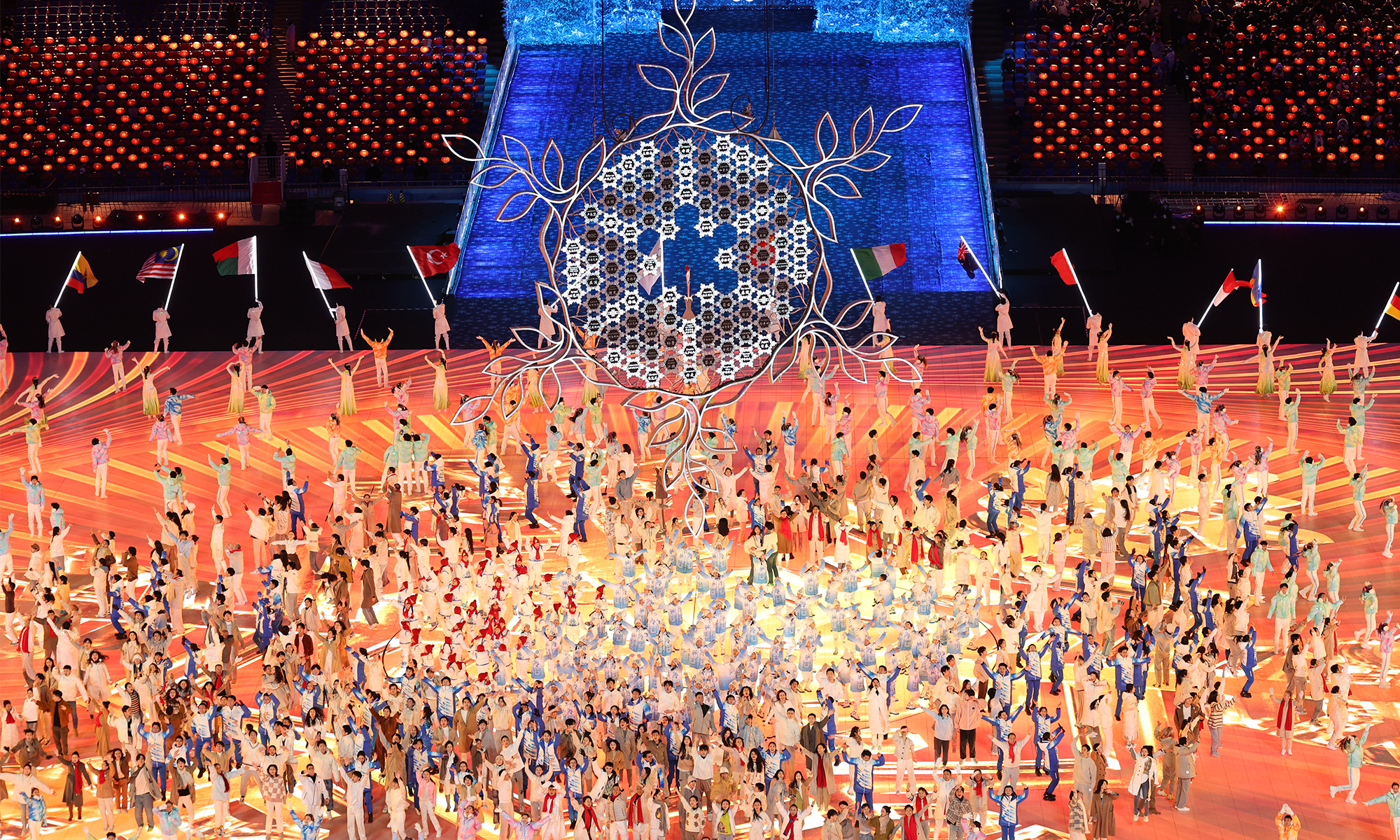
Photo: Li Hao/GT
Zheng noting that in 2022, a more confident and open China stood under the spotlight of the Olympic Games again, and it not only dazzled the world with its latest development, but also boosted the capacity of its system and governance, which propelled China to accomplish the "mission impossible" of hosting a safe but splendid international sporting event during the ravaging pandemic.
Before the Winter Olympics ended, some Western countries and media outlets were ready to have some laughs with the sporting event as they believed a country with a zero-tolerance policy of the coronavirus to receive thousands of international guests would spike the viral infection, and China would embarrass itself in the face of some Western countries' so-called diplomatic boycott of the event.
Yet more than 32 dignitaries from other countries and international organizations gave a standing ovation at the opening ceremony and conducted fruitful meetings with Chinese leaders during their flying visits to China.
With the closed-loop management system to deal with the coronavirus, only 437 positive COVID-19 cases were reported, most of which exhibited mild symptoms, and there were no cluster infections reported within the close-looped system.
"If we struck the West with our booming development in 2008… this time we dealt the troublemakers in the West with a heavy blow by showing them how effectively the Chinese mode works," said Zheng. He believed after China overcame the ordeals during the Winter Olympics, people in the West won't be able to laugh at China.
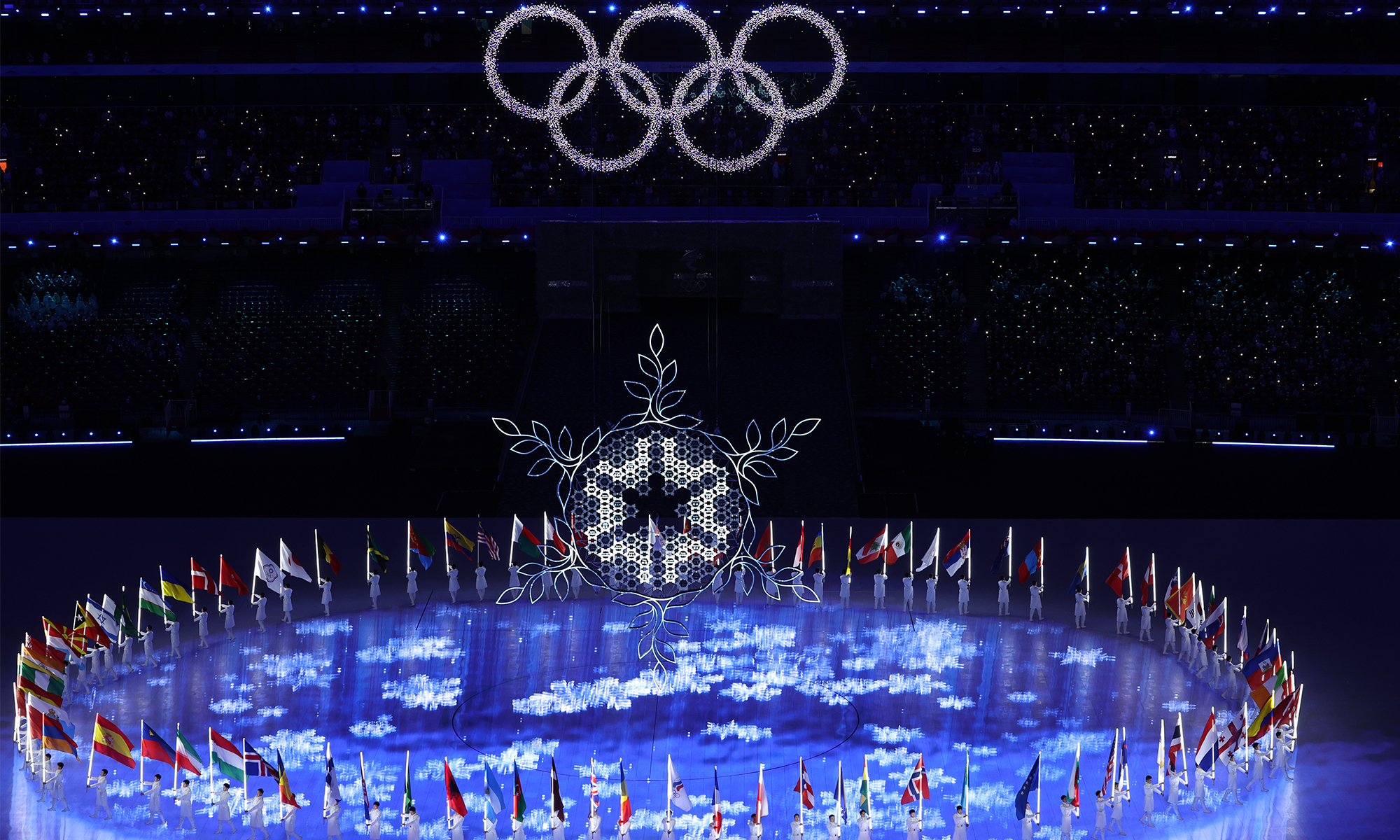
Photo: Li Hao/GT
Forward looking
Many experts believed that just like the 2008 Beijing Olympics, this Winter Olympics will also become a milestone on the road of China's great rejuvenation.
If the 2008 Olympics had boosted the Chinese people's national pride by showing the outside world the prosperity and modernity of China, this Winter Olympics will have further solidified Chinese people's confidence of its system and governance, Zhang Yiwu, a professor of cultural studies at Peking University, told the Global Times on Monday.
For the past 17 days, the Chinese people saw how its government has orchestrated the anti-COVID-19 measures within the closed loops of the Winter Olympics, where no cluster infections were reported. They also saw how the so-called diplomatic boycott initiated by the US has turned into complete failure when international dignitaries gathered in Beijing. They were also filled with joy and pride when they saw foreign athletes speak highly of the services and facilities within Olympics Villages and competition venues.
Economists also predicted that just as the Beijing 2008 Olympic Games turned out to be a radiator of resilience and hope for the global economy, 14 years later, while the global economy is grappling with a pronounced downturn amid woes over COVID-19 variants, rising inflation and various uncertainties, a sensational Winter Olympics gathering in Beijing that has set an array of new records, including a record gold haul for Team China, would only cement the country's role in pulling the global economy out of trouble.
The Beijing Winter Olympics are believed to be a huge success in economic terms, Tian Yun, former vice director of the Beijing Economic Operation Association, told the Global Times on Monday, citing the Games on a tight budget that has already created sensations like Bing Dwen Dwen.
Global economic growth is estimated to fall from 5.5 percent in 2021 to 4.1 percent this year before moderating further to 3.2 percent in 2023, the World Bank said in its latest Global Economic Prospects report in January, citing dissipating pent-up demand.
China, for its part, is poised to record a 5.1 percent growth this year, the World Bank said. The Chinese economy expanded by 8.1 percent in 2021, the fastest in a decade, based on official data.
The country has taken the global lead in fine-tuning its economy over the last two quarters of 2021, enabling its economy to have sufficient leeway to roll out easing measures, while the rest of the world, the US in particular, remains on a tight rope to raise interest rates, Tian pointed out. He noted that the Olympics-fueled optimism is seen reinforcing the edge of the Chinese economy over other major economies.
Eventually, as economists put it, China is expected to build on the Olympics-fueled bonanza to continue on course to overtake the US as the world's largest economy over the next decade.
By 2035, 14 years after the Beijing Winter Olympics Games, it's not only almost certain that China would have topped the global economic rankings, but also would have oversized that of the US by a large margin, Tian estimated.
Since 2018, no one ever had doubts about China's ability to boost its economy, yet some in the West still questioned the country's governance mode, its system, simply because it is not similar to theirs, said Zhang. He added that after the Beijing Winter Olympics, the world will no longer question the country's ability to cope with crisis, to host an exceptional international event, and to lead its 1.4 billion people to a better future.
